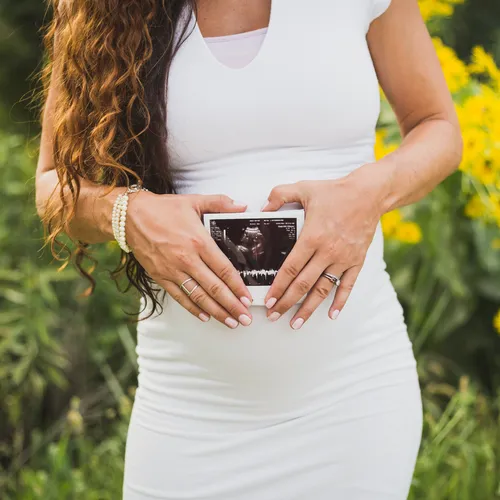Expecting Without Symptoms: What It Means If You Don’t Feel Pregnant
Why Don’t I Have Any Pregnancy Symptoms?
Every woman and every pregnancy is unique, so there is a wide range of what is considered “normal” when it comes to symptoms. Many women don’t notice anything different until 4-6 weeks into the pregnancy. Even then, symptoms can vary wildly.
According to NHS consultants, the most common early signs are:
- A missed period
- Breast tenderness
- Nausea
- Fatigue
- Frequent urination
- Changes in appetite and cravings
- Mood changes
But not everyone will experience these, or they may be so mild you don’t really notice them. There are a few key reasons why you may be symptom-free:
Irregular periods – If you don’t have regular cycles it’s easy to miss a missed period. Conditions like PCOS can cause very irregular bleeding.
Other health conditions – Illnesses that cause similar symptoms like fatigue and nausea may cover up early pregnancy signs.
Spotting – Light bleeding that seems like a period could hide the fact you’ve conceived.
Trauma or denial – In extremely rare cryptic pregnancy cases, trauma or difficulty accepting the pregnancy mentally may lead to a lack of symptoms being recognised.
How Early Can I Get Symptoms?
Some women report pregnancy symptoms even before they miss their period. It’s unlikely you’ll notice anything in the first two weeks after conception. After that, some common very early signs include:
- Implantation spotting and cramping
- Swollen or tender breasts
- Increased basal body temperature
- Darkening areolas
- Fatigue
- Nausea
- Heightened sense of smell
- Food aversions
These can start as soon as 6 days after ovulation. However, they may be very mild or inconsistent at this point. It’s more common for symptoms to become noticeable around 4 weeks.
Everyone’s experience varies, so try not to worry if you sail through the first weeks symptom-free. Equally, having early symptoms is no guarantee of a healthy pregnancy. The only confirmation is an ultrasound scan.
Can Symptoms Come And Go?
Another thing to remember is pregnancy symptoms are rarely constant. At 6 weeks you may have two days of terrible morning sickness, followed by 5 days of feeling fine. Then it returns again. This erratic pattern and fluctuation in severity applies to most symptoms in the first and second trimesters.
Don’t panic if your sore breasts, nausea or tiredness seem to disappear for a while. It’s likely they’ll return soon enough. Just monitor any changes and contact your midwife if you have any other worrying symptoms.
What About Symptoms Disappearing?
It’s perfectly normal for symptoms like morning sickness to fade or disappear after the first trimester. The placenta takes over hormone production from the corpus luteum, which often brings relief from nausea and vomiting. Discomfort from the growing womb tends to replace this.
However, if you experience sudden, rapid improvement in nausea before 12 weeks it could potentially indicate a problem. Contact your midwife or doctor straight away if you also have spotting or cramps.
Does It Raise My Miscarriage Risk?
Lacking pregnancy symptoms does not indicate a higher miscarriage risk in itself. Many early miscarriages happen before a woman realises she is pregnant.
As long as you have a normal ultrasound at your booking appointment (8-14 weeks), studies show a less than 2% chance of miscarriage afterwards. Focus on the positives if your pregnancy is progressing normally without unpleasant symptoms.
When To Speak To Your GP or Midwife
You should contact your midwife or doctor if you experience:
- Sudden disappearance of nausea/vomiting before 12 weeks
- Bleeding or spotting
- Cramping in your lower abdomen
- Any other unusual symptoms
Otherwise, try not to worry if your only symptom is a missed period. There’s a wide range of what is normal in early pregnancy. Stay in touch with your midwife and attend all scan appointments to closely monitor the health and growth of your baby.
Could I Be Pregnant and Not Know?
It is extraordinarily rare, but some women do not realise they are pregnant until they go into labour. Known as “cryptic pregnancies”, around 1 in 2500 pregnancies are not identified until birth. Cases usually involve:
- No recognisable symptoms
- Lack of weight gain
- No baby bump
- Irregular/continuing period-type bleeding
- Failure to recognise baby’s movements as such
- Psychological denial of pregnancy
Unless you have a serious psychiatric condition or hormonal issue, it is highly unlikely you could be pregnant for 9 months without realising. But cryptic pregnancies, while extremely unusual, do still happen.
When To Take A Pregnancy Test
If your period is late and you have had unprotected sex, take a test to check for pregnancy even if you feel completely normal. An at-home urine test or blood test at the doctor’s surgery can confirm if you are expecting or not.
Don’t forget that contraception is never 100% effective. The only way to be sure is to take a test.
Diet And Lifestyle Changes
If you barely feel pregnant, it can be easy to forget you’re eating for two! Continue to pay close attention to your diet and make sure you are getting adequate:
- Protein
- Fruits and vegetables
- Wholegrains
- Essential fatty acids
- Vitamins and minerals
Speak to your midwife about supplements like folic acid and vitamin D. Stay hydrated and avoid substances like alcohol, tobacco and soft cheeses. Caffeine is safe in moderation.
You should also build in extra rest periods, avoid getting too hot and overexerting yourself. Don’t take up new intense exercise regimens without medical advice. Staying active with gentle exercise is great for you and baby though!
Bonding With Your Bump
Without unpleasant symptoms constantly reminding you that you’re expecting, you may feel distanced from the pregnancy mentally and emotionally. But there are lots of other ways to bond with the baby and embrace your changing body:
- Chat, sing or read stories to your bump each day
- Use moisturiser and massage gently to connect with your skin
- Keep a journal about the experience
- Take weekly bump photos to track growth
- Learn about fetal development each week
- Shop for the baby and make plans
These things help you feel close to your baby, whether you have symptoms or not. Take it easy, enjoy the ride, and stay in touch with your midwife every step of the way.
To Recap…
- It is possible to have no pregnancy symptoms, especially in early stages
- Lack of symptoms does not mean higher miscarriage risk
- Contact your midwife if symptoms suddenly disappear before 12 weeks
- Extremely rare cryptic pregnancies can mean being unaware until labour
- Take a test if you’ve had unprotected sex and your period is late
Remember that every pregnancy journey is different and what you experience is not necessarily a sign something is wrong. Stay in regular contact with your midwife and attend all scans to monitor your baby’s wellbeing. If your pregnancy is progressing normally with few symptoms – try to enjoy it!
Photo by Christin Noelle on Unsplash
Zoom Baby is a leading supplier of Pregnancy Tests and Ovulation Test Kits





